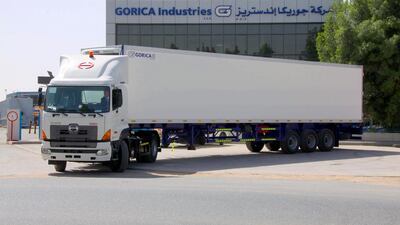The growth of the UAE’s food industry in parallel with a rising population and expanding infrastructure is helping Massar Solutions diversify beyond the cyclical fleet management business amid lower corporate spending in the capital, its chief executive said.
The Abu Dhabi-based transport company, previously known as Al Wathba, this year postponed plans for an initial public offering because of a deteriorating stock market outlook with the drop in crude.
The vehicle management company operates the car rental brand Payless and provides fleet management, supply chain and distribution services. It has held its own since the end of last year even as lower oil prices have affected corporate spending in the emirate, the chief executive Paul Greenwood said.
Its strategy to diversify is already paying dividends, Mr Greenwood added. The company has secured “a niche in managing the cold chain” as it capitalises on the growing food industry in the UAE.
The company last month put 90 lorry drivers who deliver for the Brasil Foods-owned Sadia brand through training on keeping food at a consistent temperature from warehouse to restaurant – the so-called cold chain. It plans to train 100 more drivers in cold-chain management.
Massar has 1,600 drivers on its books in total, an increase of 400 for this year, said Mr Greenwood.
The supply-chain side of the business is driving growth, he said. Its car rental and fleet operations have been slower as companies delay spending.
“For fleet overall, we have held on to our position at the end of last year. We have held our own. Customer retention is at 95 per cent,” said Mr Greenwood. “There has been a little bit of a contraction in the market from a delay in projects, as a result of the world oil price drop. The spending is going to be there. There is just caution at the moment.”
The slowdown has been felt most on the bussing side.
“We had a massive fleet of labour buses. That has contracted 30 per cent,” he said.
However, new locations for Payless in the next few months will help to grow his company’s market share, he said.
The Massar-owned fleet numbers 10,000 vehicles, of which 1,100 are Payless cars. There are a further 6,000 that it does not own on the fleet management side of the business.
The company signed a new contract with Etisalat last month for three years of maintenance, tracking and telematics and dispatching for the telecoms operator’s vehicles.
But the most promise this year lies in food distribution, said Mr Greenwood.
“We have strategically diversified ourselves to move across the entire value chain. That strategy is starting to show dividends,” he said.
The company will soon announce two new business wins in the fledgling home grocery deliveries segment, which has been aided by Dubai’s resilience to falling oil prices.
The company will distribute online produce for two big supermarkets chains. Mr Greenwood declined to name them but said Geant was not one of them.
Geant, a French retailer, is expanding its online grocery deliveries into Abu Dhabi from September.
Massar expects to begin deliveries across the country for its new clients in two months’ time after the conclusion of a pilot project in Dubai.
“I am confident to say we have cracked the model,” said Mr Greenwood. “And am very bullish on the way they go forward.”
The company will field about 100 vehicles over the next 18 months for grocery delivery. On average, each will be able to make 40 home deliveries per day, he said.
Massar has first-mover advantage, Mr Greenwood said, unlike in its other businesses, where its rivals include long-established players such as Avis, Hertz and Emirates Transport.
The development of the Khalifa Industrial Zone (Kizad), where Sadia’s production is based, has been a boost for Massar’s growing food distribution business, Mr Greenwood said.
“As Kizad grows we will grow with it,” he said. “Food will become an important product out of Kizad.”
Kizad plugs straight into the logistics corridor stretching from Jebel Ali and Dubai World Central through Khalifa Port and on to Abu Dhabi International Airport.
Massar is “watching this and how it is developing”, said Mr Greenwood. The company is considering setting up a hub in that zone, most likely in Kizad, with a decision expected within the next 24 to 36 months.
It has also invested in a facility in Dubai Investment Park that will double as a cold-chain warehouse and a logistics hub for cross-border operations into Saudi Arabia, Oman and Kuwait.
malrawi@thenational.ae
Follow The National's Business section on Twitter


